~a writeblr~ name jade pronouns she/her genres sci-fi, science fantasy wips rocket boosters, athenaeum I follow back from @jadefyre
Last active 60 minutes ago
Don't wanna be here? Send us removal request.
Text
the primary purpose of a poll is to make people angry. the secondary purpose is to receive faulty information. after that? it’s all about clicking a button.
10K notes
·
View notes
Text
Oh so ur a writer?? Prove it. Drop the last sentence of ur wip in the tags
#“He arrived before I did but I haven’t seen him since I got here”#with a comma in there where it belongs though#wip:mined over murder#<- i haven’t announced this one. i should
43K notes
·
View notes
Text
Too many writers are using generative 'AI' to make their book covers, so I've written a guide on how to make your own cover for free or cheap without turning to a machine.
If you can't afford to pay an artist, you CAN make your own!
I hope this is a helpful overview that covers the basics and points to some free resources.
14K notes
·
View notes
Text
Nuts and bolts
I've been using the Story Grid method for editing my latest novel and the one before it, and I have to say, I am thrilled.
I used a combination of the Story Grid and Save the Cat! Writes a Novel plotting methods, and I loved how that came out. It made writing the novel itself -- not exactly easy, but easier, and it made sure I had all the working parts of a story in place before I began.
The Story Grid's Youtube channel has been focused more on scene writing lately than overall whole novel writing, and I'm digging it. Right now I am going through my book scene by scene and filling out this very simple formula: "The MC wants X without having to Y." By the end of the scene, the MC has to either do Y to get X or refuse and do without. The tension comes from wanting something and not being able to get it without making some sort of sacrifice, no matter how small.
The thing I love the most about this is that the formula comes from years of reading and analyzing scenes, and figuring out what works in a scene and what doesn't, why a scene seems boring or flat and why other scenes pop and keep one reading. I've been able to look at scenes in my own favorite books and movies and do this little exercise and see exactly what's going on and moving the story.
In my own work, I had thought at least one chapter needed to be cut, because it didn't seem to be doing any work. But upon filling out this formula, I realized my main character does indeed have a solid want and a solid aversion. (Sebastian wants to protect Ian without letting her know he is trying to do that, because he told her he wouldn't be able to and she'd be on her own.) The want and aversion are more emotional, and he isn't even especially aware of them himself, but they are present, they are clear enough to the reader, and they add depth to the character and thus to the story. The chapter stays. Without this formula, I would have cut it without really seeing the work it was actually doing. (Spoiler alert, Sebastian isn't able to protect Ian very well without tipping his hand about what he's trying to do -- so he doesn't give up Y, and he doesn't get X.)
I'm having a lot of fun doing this, actually. I love telling stories. I want them to be the best they can be. This is helpful.
23 notes
·
View notes
Text
Lincoln Michel Dec 12, 2024
I’m using “TV” as a shorthand for any visual narrative art from feature length films to video games. A lot of fiction these days reads as if—as I saw Peter Raleigh put it the other day, and as I’ve discussed it before—the author is trying to describe a video playing in their mind. Often there is little or no interiority. Scenes play out in “real time” without summary. First-person POV stories describe things the character can’t see, but a distant camera could. There’s an overemphasis on characters’ outfits and facial expressions, including my personal pet peeve: the “reaction shot round-up” in which we get a description of every character’s reaction to something as if a camera was cutting between sitcom actors.
[...]
My theory is that we live in the age of visual narratives and that increasingly warps how we write. Film, TV, TikToks, and video games are culturally dominant. Most of us learn how stories work through visual mediums. This is how our brains have been taught to think about story. And so, this is how we write. I’m not suggesting there is any problem in being influenced by these artforms. I certainly am. The problem is that if you’re “thinking in TV” while writing prose, you abandon the advantages of prose without getting the advantages of TV.
[...]
When I talk with other creative writing professors, we all seem to agree that interiority is disappearing. Even in first-person POV stories, younger writers often skip describing their character’s hopes, dreams, fears, thoughts, memories, or reactions. This trend is hardly limited to young writers though. I was speaking to an editor yesterday who agreed interiority has largely vanished from commercial fiction, and I think you increasingly notice its absence even in works shelved as “literary fiction.” When interiority does appear on the page, it is often brief and redundant with the dialogue and action. All of this is a great shame. Interiority is perhaps the prime example of an advantage prose as a medium holds over other artforms.
718 notes
·
View notes
Note
oooh have you ever done a post about the ridiculous mandatory twist endings in old sci-fi and horror comics? Like when the guy at the end would be like "I saved the Earth from Martians because I am in fact a Vensuvian who has sworn to protect our sister planet!" with no build up whatsoever.
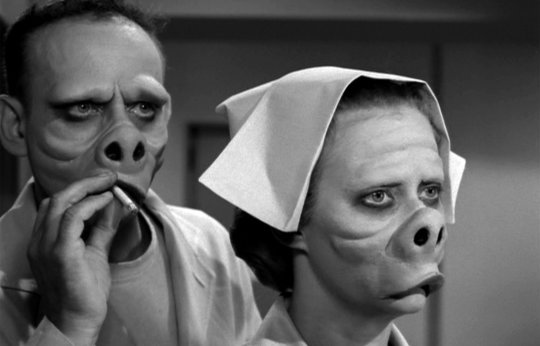
Yeah, that is a good question - why do some scifi twist endings fail?
As a teenager obsessed with Rod Serling and the Twilight Zone, I bought every single one of Rod Serling’s guides to writing. I wanted to know what he knew.
The reason that Rod Serling’s twist endings work is because they “answer the question�� that the story raised in the first place. They are connected to the very clear reason to even tell the story at all. Rod’s story structures were all about starting off with a question, the way he did in his script for Planet of the Apes (yes, Rod Serling wrote the script for Planet of the Apes, which makes sense, since it feels like a Twilight Zone episode): “is mankind inherently violent and self-destructive?” The plot of Planet of the Apes argues the point back and forth, and finally, we get an answer to the question: the Planet of the Apes was earth, after we destroyed ourselves. The reason the ending has “oomph” is because it answers the question that the story asked.
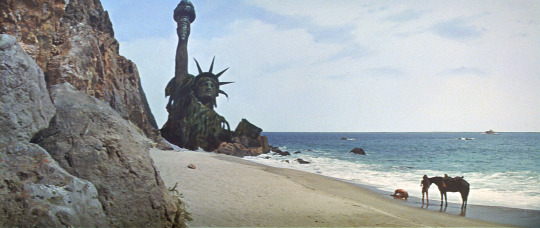
My friend and fellow Rod Serling fan Brian McDonald wrote an article about this where he explains everything beautifully. Check it out. His articles are all worth reading and he’s one of the most intelligent guys I’ve run into if you want to know how to be a better writer.
According to Rod Serling, every story has three parts: proposal, argument, and conclusion. Proposal is where you express the idea the story will go over, like, “are humans violent and self destructive?” Argument is where the characters go back and forth on this, and conclusion is where you answer the question the story raised in a definitive and clear fashion.
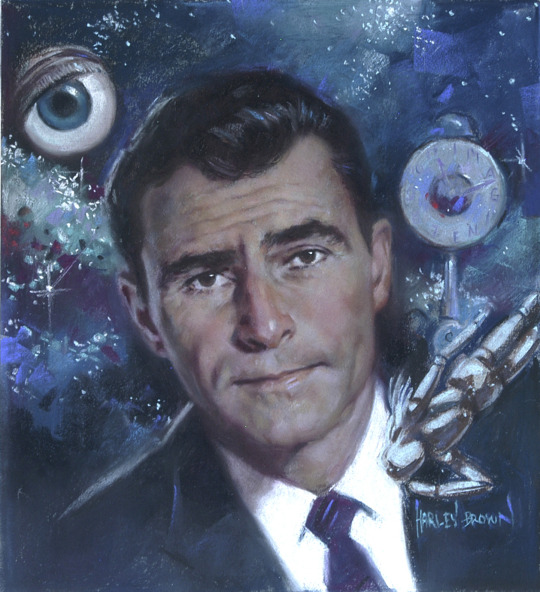
The reason that a lot of twist endings like those of M. Night Shyamalan’s and a lot of the 1950s horror comics fail is that they’re just a thing that happens instead of being connected to the theme of the story.
One of the most effective and memorable “final panels” in old scifi comics is EC Comics’ “Judgment Day,” where an astronaut from an enlightened earth visits a backward planet divided between orange and blue robots, where one group has more rights than the other. The point of the story is “is prejudice permanent, and will things ever get better?” And in the final panel, the astronaut from earth takes his helmet off and reveals he is a black man, answering the question the story raised.
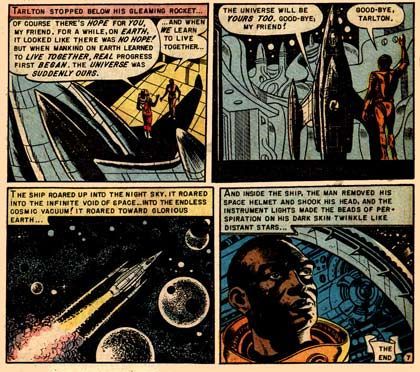
96K notes
·
View notes
Text
I hate I when I get an idea for a novel. Like oh no here starts the slow sad slip n’ slide to dissapointment again.
17K notes
·
View notes
Text
Cozy Fantasy and Why It Doesn't Work
I think I am among many who feel like they should love cozy fantasy and have found it an incredibly lacking genre.
This newly branded "cozy fantasy" genre that has taken readers by storm since 2020 and while it is new that books are now marketed as cozy, the genre itself isn't new. Howl's Moving Castle by Diana Wynne Jones is a great example of the genre before it was labeled and also how to make it work.
Cozy fantasy is defined by many as fantasy with low stakes. Fantasy aesthetic but less sword fights. On paper, it sounds great. But the execution has been less than stellar for readers like me. The lack of physical stakes has also impacted the emotional stakes of these books, creating forgettable characters with boring problems. As a romance reader, I find this frustrating. Romance is known for being a predictable and formulaic genre, the now defunct Romance Writers of America defined romances as needing happy endings, a term romances have continued to follow. Yet these romance texts manage to have low physical stakes (how to date your neighbor, how to confront your toxic friends, etc) while still maintaining high personal stakes that keep readers invested and begging for more. So I was initially confused why cozy fantasy authors struggle to write texts that connect to readers like me.
I think I have found the answer which is the genre is just here for vibes. It is all about aesthetic, not even worldbuilding that fantasy is known for as most cozy fantasy I read have so many problems as soon as you ask one question. It is hard to acknowledge that a genre that is pitched to work for readers like me doesn't work for many of us. Especially because occasionally there is one that works beautifully to my taste.
I often say my favorite cozy fantasies that are more contemporary are short and visual, which I plays into the idea of the genre being an aesthetic. The Bakery Dragon by Devin Elle Kurtz is a good example because it is a simple story that is given the perfect amount of pages and gorgeous visuals without dragging on when the message is very clear and easy to understand. Books like The Phoenix Keeper and Legends and Lattes have absolutely nothing for me, their very clear message hitting the reader over and over so the readers don't miss it and focusing on the aesthetic of worldbuilding rather than the reality of the fantastic elements within the world.
I guess my point is. . . I realize this genre isn't for me since I have realized it is more of an aesthetic than anything. .. .but I want it to be. Should I let it go and put my efforts elsewhere? Or should I keep exploring this new trend and find the hidden gems?
6K notes
·
View notes
Note
for your spotify wrapped thingy... 17 :3

Jade Dime Gentlemen’s Club

You and @tc-doherty sent me this number too, so thank you for it lovelies! I have only one snippet idea for this song, a non-canon Sasin scene I really liked but don’t think will make it canon. Or at least not in this early version, but we’ll see, because it’s too much fun.
Small Context: Kil and Anam are looking for a shapeshifter in the enemy clan's territory.
DYNAMIC EXPLORATION | NON-CANON | WC: 468
“What can I get for the gentlemen?” the bartender asked, his voice smooth and silky.
“Something import for me and,” Kil stopped, looking at Anam with visible waiting in his gaze.
“A glass of water with lime, please.”
“And that. Thank you, sport. Oh, and don’t split it, we’re together.” The man — boy, really — locked eyes with Kil once after the comment. Then, he brought out two crystal glasses and the bottles of drinks. While the cleaning water gulped inside the glass, he put a leather dossier on the counter with gilded edges that read “Repertoire for The Refined” in golden letters. The movement was so subtle, it reminded Kil of the card tricks Bald Yun taught him.
The boy glanced up again while cutting up the lime. “We have a well-curated wide range in the Jade Dime. Is there something particular that you crave tonight, sir?”
Kil decided to like the boy’s approach, forward but pinched with enough mystery to tickle one’s primal curiosity. He was leaning back to the counter with his back, halfway keeping his eyes on the singer on the stage. Her flapper glittered in the reflector like firecrackers at New Year’s, and her voice wandered from a sensual feline to a crackling fire you want to put your hand into just to touch it. He didn’t take his eyes off the woman, while he spoke. “Something a man can’t experience anywhere else.” A nod towards the silently listening Anam. “Something he would want to touch.”
The boy pushed their drinks closer to the counter, both glasses chilled instantly. “And for you, sir?”
“I’m just here to watch.”
The bartender followed his gaze, then as if Kil would have told him an inappropriate joke at a formal event, a small smile crept on his lips.
“Right away, sir.”
When he scurried away, Anam shot Kil a look.
“Are you sure this is going to work?” he asked, his quiet voice nearly drowned out by the talking and laughing guests in the room. Girls entertained important-looking men in one corner, while others simply enjoyed the glittering show on the stage. No one paid much attention to the other.
Kil tapped the dossier with his forefinger ring.
“He understood we’re here for more than just the shop window. And the one underneath this glossy surface is where they’ll be. Trust me.”
The song crescendoed to its peak, while Anam sighed into his drink as if to say: As if.
Kil smiled, turning back to the last of the performance, and lighting a cigarette. Soon, it was going to be their turn for a show, and working their way through together wasn’t a question or a choice.
But fun, it still could be.
5 notes
·
View notes
Text
HEY YOU
Yeah, you.
If you've ever enjoyed my writing advice, deep dives, literary analysis, or fiction, go to my Patreon right now and give me your opinions.
I am planning my strategy for 2025, and your feedback matters to me!
10 notes
·
View notes
Text
i made a whump wheel
want to beat up a character but don't know how you wanna do it? same here, friend. behold, the whump wheel! it currently has 60 different prompts/tropes on it and is ready for use! 🎉 i...love this thing. it is wonderful for writing exercises. (if you wanna know what's on it before using it, take a peak at the screenshot below)
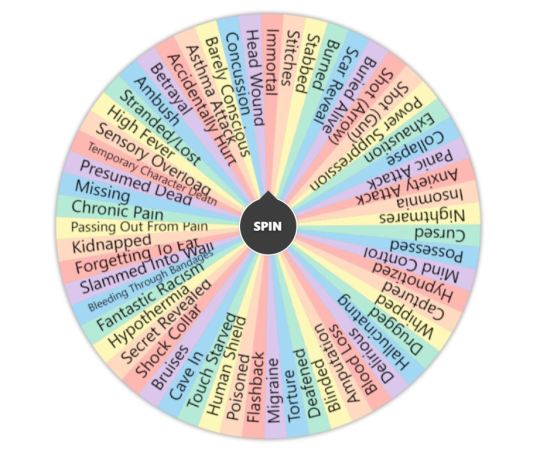
13K notes
·
View notes
Text
Weird Questions for Writers (because writers are weird)
1. What font do you write in? Do you actually care or is that just the default setting?
2. If you had to give up your keyboard and write your stories exclusively by hand, could you do it? If you already write everything by hand, a) are you a wizard and b) pen or pencil?
3. What is your writing ritual and why is it cursed?
4. What’s a word that makes you go absolutely feral?
5. Do you have any writing superstitions? What are they and why are they 100% true?
6. What is your darkest fear about writing?
7. What is your deepest joy about writing?
8. If you had to write an entire story without either action or dialogue, which would you choose and how would it go?
9. Do you believe in ghosts? This isn’t about writing I just wanna know
10. Has a piece of writing ever “haunted” you? Has your own writing haunted you? What does that mean to you?
11. Do you believe in the old advice to “kill your darlings?” Are you a ruthless darling assassin? What happens to the darlings you murder? Do you have a darling graveyard? Do you grieve?
12. If a genie offered you three writing wishes, what would they be? Btw if you wish for more wishes the genie turns all your current WIPs into Lorem Ipsum, I don’t make the rules
13. What is a subject matter that is incredibly difficult for you write about? What is easy?
14. Do you lend your books to people? Are people scared to borrow books from you? Do you know exactly where all your “lost” books are and which specific friend from school you haven’t seen in twelve years still possesses them? Will you ever get them back?
15. Do you write in the margins of your books? Dog-ear your pages? Read in the bath? Why or why not? Do you judge people who do these things? Can we still be friends?
16. What’s the weirdest thing you’ve ever used as a bookmark?
17. Talk to me about the minutiae of your current WIP. Tell me about the lore, the history, the detail, the things that won’t make it in the text.
18. Choose a passage from your writing. Tell me about the backstory of this moment. How you came up with it, how it changed from start to end. Spicy addition: Questioner provides the passage.
19. Tell me a story about your writing journey. When did you start? Why did you start? Were there bumps along the way? Where are you now and where are you going?
20. If a witch offered you the choice between eternal happiness with your one true love and the ability to finally finish, perfect, and publish your dearest, darlingest, most precious WIP in exactly the way you've always imagined it — which would you choose? You can’t have both sorry, life’s a bitch
21. Could you ever quit writing? Do you ever wish you could? Why or why not?
22. How organized are you with your writing? Describe to me your organization method, if it exists. What tools do you use? Notebooks? Binders? Apps? The Cloud?
23. Describe the physical environment in which you write. Be as detailed as possible. Tell me what’s around you as you work. Paint me a picture.
24. How much prep work do you put into your stories? What does that look like for you? Do you enjoy this part or do you just want to get on with it?
25. What is a weird, hyper-specific detail you know about one of your characters that is completely irrelevant to the story?
26. How do you get into your character’s head? How do you get out? Do you ever regret going in there in the first place?
27. Who is the most stressful character you’ve ever written? Why?
28. Who is the most delightful character you’ve ever written? Why?
29. Where do you draw your inspiration? What do you do when the inspiration well runs dry?
30. Talk to me about the role dreams play in your writing life. Have you ever used material from your dreams in your writing? Have you ever written in a dream? Did you remember it when you woke up?
31. Write a short love letter to your readers.
32. What is a line from a poem/novel/fanfic etc that you return to from time and time again? How did you find it? What does it mean to you?
33. Do you practice any other art besides writing? Does that art ever tie into your writing, or is it entirely separate?
34. Thoughts on the Oxford comma, Go:
35. What’s your favorite writing rule to smash into smithereens?
36. They say to Write What You Know. Setting aside for a moment the fact that this is terrible advice...what do you Know?
37. If you were to be remembered only by the words you’ve put on the page, what would future historians think of you?
38. What is something about your writing process YOU think is Really Weird? If you are comfortable, please share. If you’re not comfortable, what do you think cats say about us?
39. What keeps you writing when you feel like giving up?
40. Please share a poem with me, I need it.
19K notes
·
View notes
Text
















ive gotten quite a few questions about this so i sat down and wrote it all out for a discord power point night. here it is. no mystery, only chaos, and if novellas have no fans then i am dead.
899 notes
·
View notes
Text
yes
Fuckkkk how long are chapters
#real answer is: as long as you want them to be.#you can have short ones and long ones. you can have them all come in around 3k you could have them all come in around 1k or 5k or whatever#if it feels like a good place to end a chapter then it probably is.
9 notes
·
View notes
Note
I'm sorry your writing strategy is WHAT?? I'm going to need a thorough explanation of this because I'm FASCINATED
[brian murphy voice] I DIDNT SAY ANYTHING WEIRD!!!
okay i did. but also! if it ain’t broke…
here’s how this crumbles cookie-wise. sometimes (as is currently the case) i feel like i am trying to hold onto a whole novel in my brain at once. this does not feel particularly good because the novel doesn’t belong in my brain it belongs Out There. so i make a very detailed outline and then i start at chapter 1, and i write to 100 words (give or take a few). then i move on to chapter 2 and write to 100 words. then to chapter 3 and so on until i have at least 100 words in each chapter. then once i’ve run through the whole book, i go back to the beginning and make sure each chapter is up to 200. then i’m usually in the Meat of each scene so i’ll get everything up to 500, then 1000, then 1500 and then usually i clock out of chapters around or just under the 2k mark.
this appeases the hyperactive part of my brain by making sure i’m never bored, and helps the project manager in my brain so i can keep track of many moving parts in the novel and also ensures that scenes at the end speak to scenes at the beginning since i’m (sort of) writing the whole book at once.
NOTE: sometimes i get lost in the sauce and write way past 100 or wherever im at, and that’s fine. it just means i probably skip that chapter during my next pass since it’ll be past my goal wc for each chapter of the run.
that is all. try it, if you want. i honestly don’t know how to write books any other way
4K notes
·
View notes










